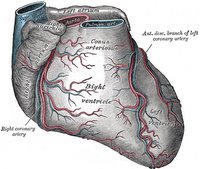 The not-so-old 2005 AHA CPR guidelines put much more emphasis on chest compressions as opposed to rescue breaths. For the first time, the AHA advised CPR performers to give 30 compressions for every two rescue breaths, i.e. 30:2 (the old ratio was 15:2).
The not-so-old 2005 AHA CPR guidelines put much more emphasis on chest compressions as opposed to rescue breaths. For the first time, the AHA advised CPR performers to give 30 compressions for every two rescue breaths, i.e. 30:2 (the old ratio was 15:2).It's not ABC anymore, DocAroundTheClock half-jokingly wrote, it's ACB (airway, compressions, breathing).
Well, it looks like it will be just AC (airway, compressions) from now on. Click here for the official AHA advisory on Hands-Only (Compression-Only) Cardiopulmonary Resuscitation published in Circulation (PDF file).
According to the CNN report from the 2008 AHA meeting, chest compressions-only CPR works as well as the standard technique in adults:
"Bystanders will now be more willing to jump in and help if they see someone suddenly collapse. Hands-only CPR is simpler and easier to remember and removes a big barrier for people skittish about the mouth-to-mouth breathing.
"You only have to do two things. Call 911 and push hard and fast on the middle of the person's chest."
Hands-only CPR calls for uninterrupted chest presses -- 100 a minute -- until paramedics take over or an automated external defibrillator is available to restore a normal heart rhythm.
This action should be taken only for adults. A child who collapses is more likely to primarily have breathing problems -- and in that case, mouth-to-mouth breathing should be used."
It's not Rocket Science, it's Hand-Only CPR!
See the CNN video: Heart Association: Hands-only CPR works.
Mr. Bean did not feel very comfortable performing mouth-to-mouth breathing either, as you can see from this YouTube video (not to be taken seriously).
References:
Heart Association: Hands-only CPR works. CNN.
Hands-Only (Compression-Only) Cardiopulmonary Resuscitation: A Call to Action for Bystander Response to Adults Who Experience Out-of-Hospital Sudden Cardiac Arrest. A Science Advisory for the Public From the American Heart Association Emergency Cardiovascular Care Committee. Circulation.
Image source: Gray's Anatomy, 1918, public domain.
Related:
Dangers of unrecognized heart disease: Husband dies while giving wife CPR (both found dead, age 60, 59) http://goo.gl/LZ39U
British Heart Foundation is urging people to forget "mouth-to-mouth" during CPR: 'no kissing, just hard CPR'. BBC, 2011.
British Heart Foundation is urging people to forget "mouth-to-mouth" during CPR: 'no kissing, just hard CPR'. BBC, 2011.